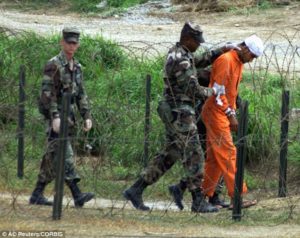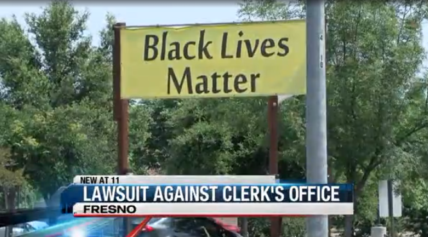In a stunning display of geopolitical hypocrisy, the United States won’t allow the United Nations special investigator on torture to inspect prisons in the U.S. or interview inmates at Guantanamo Bay—just as the U.S. blasts Venezuela for human rights abuses.
It is a case study in why the U.S. has such a tiny measure of moral authority around the globe, acting as the world’s bully when its own house is far from in order. And all the while impervious to the hypocrisy, as if the rest of the world doesn’t notice America’s consistent two-faced diplomacy. Such is the implacable face of white supremacy, blind to its own misdeeds—or simply indifferent.
Juan Mendez, the U.N.’s special rapporteur on torture and other cruel, inhumane or degrading treatment or punishment, said that for the past two years he has been trying to gain access to federal prisons in New York and Colorado, as well as state prisons in California and Louisiana, among others. He said he has been trying to go through the U.S. State Department, but he still hasn’t been given access after two years.
Mendez said he was particularly concerned about the use of solitary confinement in these jails for underage offenders. According to the American Civil Liberties Union (ACLU), more than 80,000 people are held in solitary confinement in the U.S. on any given day.
Mendez said solitary confinement for children “should never happen, even for a single day.” He said the punishment, widely considered cruel even for adults, was “particularly harmful for children because of their state of development and their special needs.”
“It’s simply outrageous that it’s taking such a long time to provide access to American detention facilities,” Jamil Dakwar, head of human rights at the ACLU, wrote in an email to the AFP news agency. “This begs the question: is the United States hiding something?”
These complaints from Mendez come in the same week that the U.S. has charged Venezuelan officials with committing violence against anti-government protesters.
And it all comes at the same time as Mendez released a report lashing the United States for being the only country in the world that continues the cruel and inhumane practice of imprisoning children for life without the possibility of release. Because of the unique vulnerabilities of children, Méndez dedicated an entire 21-page report to their status in the world and singled out the United States for its unusually cruel treatment of youths.
More than 2,500 individuals in the U.S. currently serve a life sentence without possibility of parole for crimes they committed as children. As revealed by the Sentencing Project in a report released in 2012, Black children are far more likely than any other children to receive life sentences—demonstrating once again that the U.S. has no interest in insuring that Black children receive equitable treatment.
“The unique vulnerability of children deprived of their liberty requires higher standards and broader safeguards for the prevention of torture and ill-treatment” wrote Mendez, who is a law professor at American University. “Life sentences without the possibility of release for children are expressly prohibited by international law and treaties. The vast majority of States have taken note of the international human rights requirements regarding life imprisonment of children without the possibility of release. Significantly, the United States of America is the only State in the world that still sentences children to life imprisonment without the opportunity for parole for the crime of homicide.”
Mendez also harshly criticized the Obama administration for not providing him with “acceptable” access to the infamous prison camp at Guantanamo Bay and to the 122 detainees still being held there.
Mendez said in 2012 he was told he could visit the prison camp but under “unacceptable” conditions: He would be allowed to only visit parts of the prison and wouldn’t be allowed “any unmonitored or even monitored conversations with any inmate in Guantanamo Bay.”
The continued existence of the Guantanamo prison for the past 13 years and the repeated revelations of torture and murder committed there by American military and intelligence officers has been the focus of considerable international outrage. Just this past January, a staff sergeant at Guantanamo Bay, Joseph Hickman, a Marine veteran who reenlisted in the Maryland National Guard after 9/11, released a book in which he claims three men the Pentagon says killed themselves were actually tortured to death by the CIA.
In “Murder at Camp Delta: A Staff Sergeant’s Pursuit of the Truth About Guantanamo Bay,” Hickman paints a sinister picture of the government’s use of the prison as a “battle lab” for cruelly inventive, experimental torture tactics. While the U.S. government has said Yasser Talal al-Zahrani of Yemen, and Salah Ahmed al-Salami and Mani Shaman al-Utaybi, both of Saudi Arabia, hanged themselves in 2006 in a suicide pact, Hickman says they were murdered while he was on duty.
Devastating charges such as these make it truly remarkable that the U.S. with such ease is able to level charges of human rights abuses at other nations, usually non-white nations where the U.S. has no economic or political interests.
The U.S. hypocrisy was on display in December when media reports surfaced that the U.S. was considering removing Cuba from the politically important list of nations that are “state sponsors of terrorism” and adding North Korea to the list. At the time, ABS wrote that it appears there are two major characteristics a country needs to be a candidate for the list: the country needs to be non-white and be of little political importance to the U.S.
If that weren’t the case, the U.S. would have added Russia to the list long ago because of its military and financial support for Syria and its President Bashar al Assad, who has been accused of killing hundreds of his own people with chemical weapons.
The list currently has four names on it: Cuba, Iran, Syria and Sudan.


